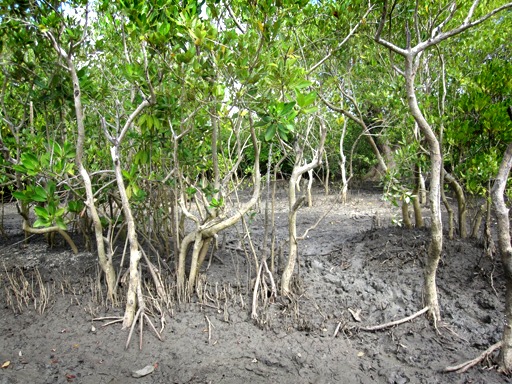It is widely acknowledged that well-functioning ecosystems provide reliable and clean flows of fresh water and air, productive soils, healthy and balanced biota, and many other services that contribute to the well-being of humans. It is also widely documented that many ecosystems and the services they provide are under severe threat globally. Human pressure and economic activities are currently compromising the resilience of these ecosystems and eroding their natural capacity to deliver vital regulating, provisioning, supporting and cultural services.
The reality is that conventional, punitive approaches to natural resource management and conservation have mostly failed and economic growth has taken place at the expense of the natural environment.
Ecosystem services and functions:
|
In the developing world, countries face the challenge of simultaneously developing their economies to meet the needs of their people; while ensuring that the productivity and viability of the underlying ecosystems are maintained at healthy levels over time. Most developing countries are dealing with pressing development challenges and are constrained financially, finding it difficult to allocate resources for purely conservation-related initiatives.
Also, resource depletion and ecosystem degradation have not traditionally been included in national accounting measures and neither have these resources been valued as capital assets. Resource use (whether sustainable or not) reflects positively on GDP indicators. These measures of economic well-being do not register the corresponding decline in assets (wealth) that is a more appropriate measure of future economic prosperity. Many ecosystem services are available freely (such as fresh water in aquifers and the use of the atmosphere as a sink for pollutants) and so their degradation is not reflected in standard economic measures.
When the economic losses associated with natural resource depletion are factored into measurements of a nation’s ‘true’ wealth, the balance sheet of countries with economies dependent on natural resources will change significantly.
Incentive schemes that promote the conservation of ecosystems and their services
The use of markets, market-based mechanisms and economic instruments to conserve and pay for ecosystem services is a growing global trend that is gaining a solid foothold not just in carbon markets, but also biodiversity and water markets.
Payment for Ecosystem Services (PES) schemes have been structured around the premise that natural ecosystems provide valuable services and that if marketed correctly, these services might help watershed and biodiversity conservation pay for itself and generate income for those willing to participate. The idea is that these measures will encourage behavioural change by using economic incentives, offering, where possible, additional employment benefits and supplementary income for the promotion of the long-term sustainable use of natural resources or conservation.
PES schemes are no longer solely of interest to conservationists but have gained recognition among local communities, government regulators, private businesses, and international financiers. Schemes to date have encompassed private deals, both voluntary and obligatory; financing schemes; government programmes and a mixture of public-private partnerships.
Although market-based mechanisms are by no means a natural resource management solution, PES schemes may encourage African decision makers to incorporate nature’s ‘services’ or non-market benefits into their development choices and to better quantify the value of these services – so as to entice investment back into conservation and not necessarily into an alternative use. The total economic value associated with managing ecosystems more sustainably is often higher than the value associated with the conversion of the ecosystem through farming, logging, or other intensive uses.
These decisions are particularly pertinent in Africa where countries are poised to receive an influx of new wealth from oil, coal and gas deposits, with potentially devastating consequences for the physical environment.
Market mechanisms and PES schemes like biodiversity offsetting mechanisms and blue carbon projects offer financial incentives to protect non-market ecosystems benefits. Through a process of economic valuation, these mechanisms help decision-makers to visualise the true impacts of their potential decisions, and to identify tradeoffs and compatibilities between environmental, economic, and social benefits. PES schemes also encourage policymakers to recognise that ecosystem services are contributing to the well-being of their constituents and their envisaged economic development.
Degraded ecosystems are dangerous for African livelihoods
The UN-initiated Millennium Ecosystem Assessment (MA), conducted in 2005, found that 60% of global environmental services assessed are being degraded faster than they recover or used in an unsustainable manner.
Africa is central to this debate as it is home to a vast variety and abundance of the world’s biological and natural resources. The Southern and Eastern African regions host seven of the world’s biodiversity hotspots. From Ethiopia to the Cape, the region contains several centres of endemism where species of birds, mammals and plants reside nowhere else in the world.

Healthy ecosystems are particularly important in Africa where the majority of its people are directly reliant on ecosystem services for their primary income. Even where natural resources are scarce, many people do not have alternative livelihood options. The harmful effects of the degradation of ecosystem services (the persistent decrease in the capacity of an ecosystem to deliver services) are being borne disproportionately by the poor and are contributing to growing inequities and disparities amongst societies. In sub-Saharan Africa the condition and management of ecosystem services is a dominant factor influencing prospects for reducing poverty.
Policy discussion and implications
Although the MA made great strides in raising awareness about ecosystems and their services, translating these findings into concrete policy recommendations and policy changes requires longer-term engagement strategies and the development of new tools and approaches that are applicable and easily understood.
The international community needs to work towards improving the set of ecosystem services indicators to support the application by policymakers of ecosystem services concepts. This is important so that policymakers can base their decisions on evidence; identify and prioritise interventions; track progress towards goals; and inform corrective action in a timely fashion.
Strategies will be needed to communicate the value and condition of ecosystem services to policy-makers and help them integrate this information into their countries’ social and economic indicators. This evidence will demonstrate the harmful effects of the degradation of ecosystem services on livelihoods, health, and local and national economies.
Policymakers also need to take contextual realities into account. PES schemes do not operate in legal, social or political vacuums. A range of laws, policies, institutions and stakeholders affect them. Research can highlight what tools need to exist to support the necessary financial, regulatory and legislative frameworks. Ecosystem service considerations need to be integrated into mainstream economic planning and development policy.
At a national level ecosystem services schemes need to be incorporated into existing regulatory mechanisms – complementing existing regulatory approaches and not necessarily replacing them. Governance constraints prohibiting the successful payment for environmental services must be addressed. PES schemes are difficult to implement in areas where institutional capacity and transparency are lacking or where resource access and ownership are in dispute. Research can promote clarity around resource governance, land tenure, and affected communities’ rights.
African countries and regional organisations have not taken advantage of the opportunities offered by ecosystem markets. There are a number of reasons for this including a lack of adequate awareness, technical knowledge, lack of appropriate market mechanisms and governance failures. Regional organisations should be at the forefront of these debates – calling member countries to position themselves appropriately to take advantage of such opportunities.
African countries and appropriate stakeholders need to take stock of ecosystems markets and payment schemes, and develop equitable sharing models that benefit those communities most vulnerable and dependent on ecosystems.








